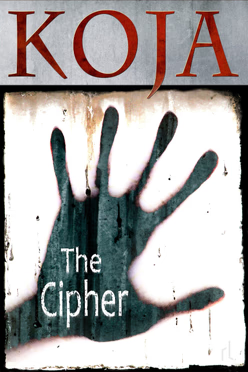The Cipher

How to describe The Cipher? The plot concerns Nicholas, an aimless twenty-something drifting through life, who discovers a mysterious hole inside a disused storage room in his derelict apartment building. Weird things ensue.
But this doesn’t convey a sense of the book’s dichotomy. Sometimes brilliant, sometimes frustrating, often both. Bear with me.
Author Kathe Koja sets the story in an unnamed American city. A city big enough to support an underground art scene, sprawling enough for cars, and far enough north that blizzards aren’t uncommon. Think Detroit or somewhere in the Rust Belt. This setting proves an ever-present character, like Raymond Chandler’s Los Angeles.
I cursed my way into the shower, glad as I drove breakfastless to work beneath trees bare as telephone poles and signs for things I never did or would.
We’ll revisit the Chandler comparison later. Let’s continue with the atmosphere. Published in 1991, the book foreshadows the 90s grunge scene. Everything feels grimy.
Especially that night: detritus smeared all over, puddles of spilled beer and toppled ashtrays and some crusted cheeselike stain on the shower curtain that even I, drunk as I was (and I was), couldn’t bear to look at.
And when Nicholas discovers the hole—the Funhole—as he calls it, Koja crafts the perfect stream-of-consciousness to illustrate its unsettling opaqueness when they try throwing something into it.
(an asphalt rock plucked from the parking lot, not too big and not too small; it made no sound, no sound at all, can you imagine how spooky that is?).
I can imagine.
Accompanying Nicholas in his discovery is Nakota, the object of his unrequited love. Nakota is everything Nicholas is not: assertive, driven, confident, manipulative. Nicholas proves self-aware enough to recognize his plight, but incapable of effecting change.
Skid and drift, that was me and the way I lived my life, foolish, hopeless, irredeemable, a broom-closet hellhole my epiphany, my one true love a woman who had never come close to loving me, even on my best days, her best days, this woman my lover now again in what was at most a terminal waste of time. Ah God, the happy hells I can create, you too, all of us. Even Nakota. We are all our worst best friends. Don’t agree? Go fuck yourself.
Here the book falters. Koja paints Nakota with vivid detail, but never shows us what Nicholas sees in her. Instead, Koja relies on shared experience. We’ve all known someone like Nakota. Part of growing up is learning to steer clear of her type. Had I read this as a teen, I could have empathized with Nicholas. But middle-aged, it’s hard to place myself in that emotional state.
Which ties to the book’s biggest shortcoming. Nicholas proves an uncompelling protagonist. He is the titular cipher, with no agency and no ambition. He has no friends, works in a video store, lives in a studio tenement, and subsists on beer. Though his body undergoes dramatic and unsettling changes, he lacks a corresponding emotional arc. Again, had I read this as a teenager, Nicholas’s angst may have resonated. But, as is, I found myself frustrated. The stilted plotting relies on other characters to move it forward.
Don’t let my frustrations dissuade you. The book entertains. Returning to the Raymond Chandler comparison, Koja proffers several memorable lines reminiscent of Chandler’s cynicism.
For example, when Nicholas experiences a rare moment of clarity:
I had been purely and unarguably right. An odd feeling. Not pleasant. You can get used to being wrong all the time; it takes all the responsibility out of things.
And lines reminiscent of Chandler’s deft similes.
My instant coffee tasted like the devil’s asshole.
This ever-present wit tempers the angst. Consider this scene where Nicholas wonders how long he’ll have to endure the Funhole’s machinations. Until when?
Until you’re assumed in a pillar of cloud, until all the blood in your body turns to gold, until you go crazy from your own dumb solitude and throw yourself in a grand suicidal gesture not down the hole but out a friendly window?
What a melodramatic asshole I was turning out to be.
Koja introduces more characters to jump-start the finale, including Malcolm, a pretentious celeb in the local underground art scene.
He fell into step with me, or rather linked his ironic amble to my perpetual slouch. I bet he even shaved ironically.
I pictured him as a young Malcolm McDowell.
Koja also throws off a bit of bad comedy that nonetheless elicited a guffaw.
Dave was even moved to crack a joke, something about the superrealists who froze to death when they went to the drive-in to see CLOSED FOR WINTER.
As the story pushes toward its conclusion, Koja ramps up the body horror, proffering lines reminiscent of Clive Barker:
All bodies are, in some sense; engines driven by the health or disease of their owners, jackets of flesh that are the physical sum of their wearers.
But, as Nicholas says, “Speculation becomes meaningless when it never blossoms.” And so Koja allows it to blossom. The result didn’t floor me, but at least justified the time invested.
As a debut novel, The Cipher impresses. It’s not without flaws, but the sheer originality, combined with the dry wit and existential horror, left me eager to read more of Koja’s work.
Reading History
- 2023Jan29SunEbook (Roadswell Editions, 2012)
Read over 8 Days
- 22 Jan 202314%
- 23 Jan 202321%
- 24 Jan 202333%
- 25 Jan 202342%
- 26 Jan 202351%
- 27 Jan 202359%
- 28 Jan 202376%
- 29 Jan 2023Finished